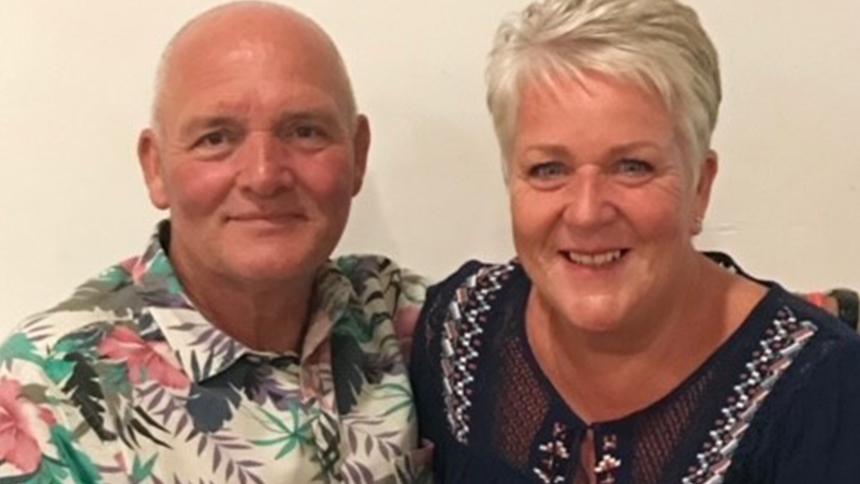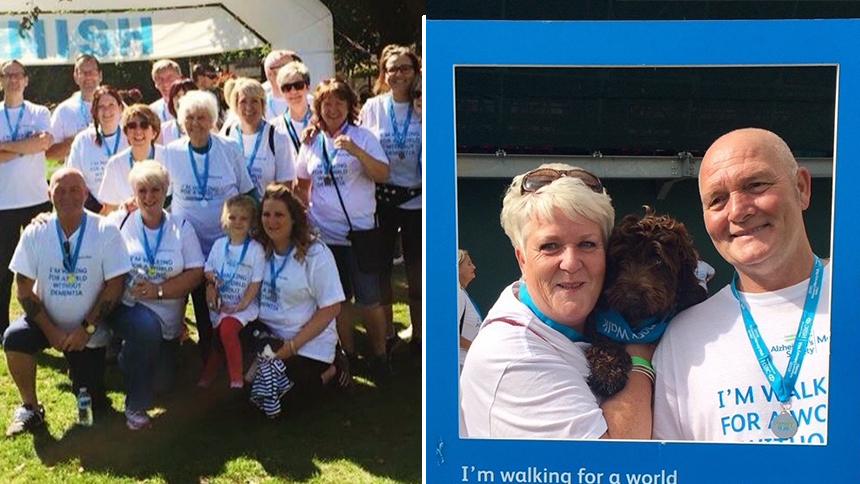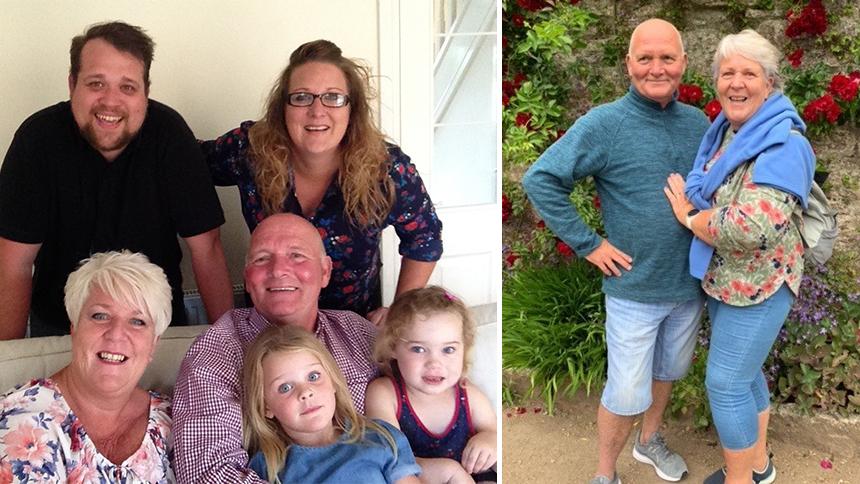Husband’s young-onset Alzheimer’s diagnosis made me passionate about educating others
Tracey Seymour, whose husband was diagnosed in his mid-50s, wants to challenge the perception that dementia only affects older people.
Since her husband Paul was diagnosed with Alzheimer’s aged just 54, Tracey Seymour has been on a mission to raise awareness about the impact of dementia on younger people.
‘So many people think this is part of getting older but it’s a disease, like cancer, not a normal part of ageing,’ says Tracey, who gave up work to care for Paul.
‘Paul was in his 50s with a job and a mortgage. I want to shout from the rooftops that dementia is not just about granny and grandad.’
Shock and denial
Tracey and Paul live in his hometown of Midsomer Norton in Somerset. They married within 15 months of meeting and recently celebrated their 39th wedding anniversary.

Paul and Tracey.
Tracey is a trained hairdresser who more recently worked as a private cleaner. Paul, now 61, worked as a lithographic printer before redundancy led to him becoming a construction labourer. They have two children and three granddaughters.
Tracey recalls the first signs that something wasn’t right with Paul’s memory.
‘He used to come home and say that the younger lads were playing jokes on him, moving his tools and kit,’ she says.
‘There’s a level of forgetfulness that you know you shouldn’t really have, when you frequently forget dates, times and names. That’s when Paul said to me, “There’s something going on.”’
Paul saw his GP, and tests at a memory clinic suggested he might have mild cognitive impairment, where someone has minor problems with mental abilities such as memory or thinking. Further tests and two brain scans later, Paul was diagnosed with young-onset Alzheimer’s in October 2014.
‘Paul just said something like, “Okey-dokey,”’ recalls Tracey. ‘I think he was shocked and in denial. I felt relief – “Now we know what we’re dealing with.”’
On a quest
Tracey noticed that the posters and leaflets at the memory clinic only showed older people, which motivated her and Paul to challenge that perception by sharing their story in the media.
‘We went on a campaign to raise awareness that dementia can happen in under-60s,’ she says. ‘We did daytime TV, that was very exciting. You go on a bit of a quest and get very wrapped up in it all.’
The couple also did two successful Memory Walks in Bristol and Bath, to raise vital funds for Alzheimer’s Society.

At Bristol Memory Walk 2015 and Bath in 2016.
Sad and frustrated
Tracey and Paul tried to carry on as normally as possible, including continuing to work. However, the progression of Paul’s dementia has been very noticeable.
‘Alzheimer’s is not just memory loss, but also your whole thinking process,’ says Tracey. ‘On a bad day, he’ll struggle to make a cup of tea and will ask me for help. Dementia affects every single task he does.’
Tracey, who has lasting power of attorney for Paul, says that her husband’s abilities have declined more quickly than she ever expected.
‘Paul is a fun-loving, bouncy, bubbly person, but forgetting people’s names or not getting a sentence out makes him sad and frustrated,’ she says. ‘It’s the whole sadness of it all. He’s only 61.’
Amazing employer
Paul worked for a property developer for five years, until March 2020.
‘Paul’s employer was amazing,’ says Tracey. ‘He employed Paul after his diagnosis. I expect a lot of people wouldn’t do that, so we were very grateful.’
Paul’s duties at work were changed as time went on, to allow him to remain in the job for as long as possible. His last day was in early March, just before the pandemic took hold.
‘He was distraught to lose his job and then it was lockdown – it was a double blow,’ says Tracey. ‘That’s where I saw the biggest change, in those following months. It all had a big impact on Paul.’
With Paul’s dementia seeming to progress particularly quickly during late 2020 and early 2021, Tracey decided to give up work.
‘I wanted to be here with Paul all the time, so in January I decided not to go back,’ she says.
‘First and foremost I’m Paul’s wife, but I’m also now his paid carer, because of Carer’s allowance. I see it as my wifely role and as my job.’
Tracey is making adjustments ‘all the time’ at home.
‘I might have to reword something in simpler language or, if I want to involve Paul in mowing the lawn, he’ll go beside me, holding the wire,’ she says.

Tracey says they receive excellent support from family.
Community comfort
Tracey and Paul receive excellent support from family and great understanding from friends. Tracey has also found Talking Point, the Society’s online community, extremely useful.
‘For three years at the beginning, that was my go-to. I was on there all the time, spouting off!’ she says.
‘Although I couldn’t see them, people understood and were in the same boat as me. It was my comfort, they knew exactly what I was feeling and saying.’
Talking Point members gave Tracey the idea of printing and keeping lots of photos from holidays and occasions, for Paul to look through. The couple are also keen runners, regularly joining their local Parkrun.
‘They all know Paul has Alzheimer’s, so the marshals help him with the route if he gets a bit muddled,’ says Tracey. ‘I want to keep Paul fit and healthy, and look after my own wellbeing.’
Tracey is also now supporting her 89-year old mum, who was recently diagnosed with Alzheimer’s.
‘I have bad days and sad days, but I’m a great coper and I feel quite strong,’ says Tracey.
‘I borrowed a famous phrase when I said that there’s three people in our marriage – me, Paul and Alzheimer’s. Paul’s retirement has been taken away and we’ve had to reroute our futures.
‘I know what the future entails, but you can’t change it, so you just have to make the most of what you’ve got and live in the here and now.’
Get checked
For Tracey, the here and now includes spreading the message that dementia can affect younger people.
‘It’s my passion to try and educate people about it,’ she says.
‘Men of Paul’s age don’t always talk about things, but if you’re 50 and have a bad memory, go and get it checked out. Paul always used to say that he’d want other people to do that.
‘If we help even one person to go to the doctor about their memory, we’ve done our job.’
Donate
You can support people affected by young-onset dementia come to terms with a diagnosis.


Lynn
saysMy husband was diagnosed in 2019 but looking back has had Alzheimer's years before this diagnosis. His company took him to disciplinaries for not handing time sheets in or pushed him to take holidays to get him off . Terrible times, took him to gp and he went through tests, brain scans and was diagnosed with Alzheimer's at 56. It was heartbreaking and a relief as I knew what to expect as I had lost my father to Alzheimer's after looking after him for 10 years. After 3 lockdowns and feeling totally alone to navigate your way through this journey that no one seems to understand I felt at breaking point and I feel I'm a strong woman. . From the outside looking in he's Graeme the partner of 45 years, the father to our son , who he doesn't recognize any more and the grandad to our 6yr old and 2 old grandaughters. He doesn't know what day it is has no conception of time, can't do basic tasks to take his meds and struggles to get his hand to his mouth to take his tablets. I wash him dress him and keep his dignity but his frustrations come out when he has these very few episodes of clarity and he cries and asks is he going to die. We all are my darling as I hold him tight and tell him he's safe. May god bless every carer who looks after and silently struggles every day. xx
Thank you for sharing your story, Lynn. Please know that you are not alone, and we are here for you if you need someone to talk to.
You can call our Dementia Connect support line on 0333 150 3456 to speak with one of our trained dementia advisers. They are here to listen to you, understand your situation and provide you with support. More details about the support line (including opening hours) are available here: https://www.alzheimers.org.uk/dementia-connect-support-line
You might also find it helpful to talk to others who have been or are in similar situations. Within our online community, Talking Point, carers and other people affected by dementia share experiences, advice and offer support. You can browse the community or sign up to become a member: https://www.alzheimers.org.uk/get-support/dementia-talking-point-our-on… It's free to use, and open day or night.
We hope this helps, Lynn. Please do call our support line if you need someone to talk to. Or, if you'd like to share more of your story with us to help raise awareness, please consider getting in touch with our Stories team - they'd love to hear from you: https://www.alzheimers.org.uk/get-involved/share-your-story
Remember to call 0333 150 3456 if you need help from a dementia adviser.
Alzheimer's Society Website team
Julie Hayter
saysI feel as I'm looking in a mirror my Husband Also has early onset Alzheimers in his mid 50s he has had it now 10years I looked after him untill It became impossible for him to live at home my biggest regret & the saddest day of my life was Dave going into a nursing home, he is now in the last stages & is completely Paralyzed Alzheimers has stolen every part of Dave & stolen our grown up Children of there dad & our Grandchildren of never knowing there Amazing Grandad, Dave is the love of my life❤️ we have been Married for 47 years & would Marry him all over again in a heartbeat, was so fit he was a marathon Runner, even ran the London Marathon played Football & Cricket & enjoyed life to the full, haveing told you a little of our story Alzheimer's will never steal our love that will stay's in our Hearts forever, Alzheimer's doesent only Affect older people it can & will also Affect young people so I also make it my Passion to Educate Everone I pray one day they will find a cure so no one will ever have to go through this dreadful journey, Thankyou ❤️
Mike Parish
saysSuch a touching story and mirrors a very similar experience I had with my husband. We are now into about the 13th year of the entire process and he is now still well but at late stage. I think for a lot of people Tracey story will not only be familiar, particularly the sense of the need to raise awareness but that someone is on this pathway essentially alone doing with each unique impact of dementia as it progresses. It feels very much like the time should’ve come by now that a dementia diagnosis will result in a patient multi-year plan by the health and social care organisations supplemented by the many voluntary organisations that work so hard to deliver support and care that’s missing elsewhere. It is a lonely journey as well as a self-awareness journey too. In no other realm of illness Is one expected to coordinate your loved ones care, to expect to know everything there is to know about the illness (dementia) to be able to seek out and orchestrate all of the services needed to help you. It’s a model that can work for sure, and it’s the only model that most of us have had to work with but I think when we look for both raising awareness and improving the lives of people with dementia we need somehow to focus on how to get our GPs, neurology services, Therapy centres and social care services to up their game and develop comprehensive and ongoing patient and carer support planning and provision solutions.